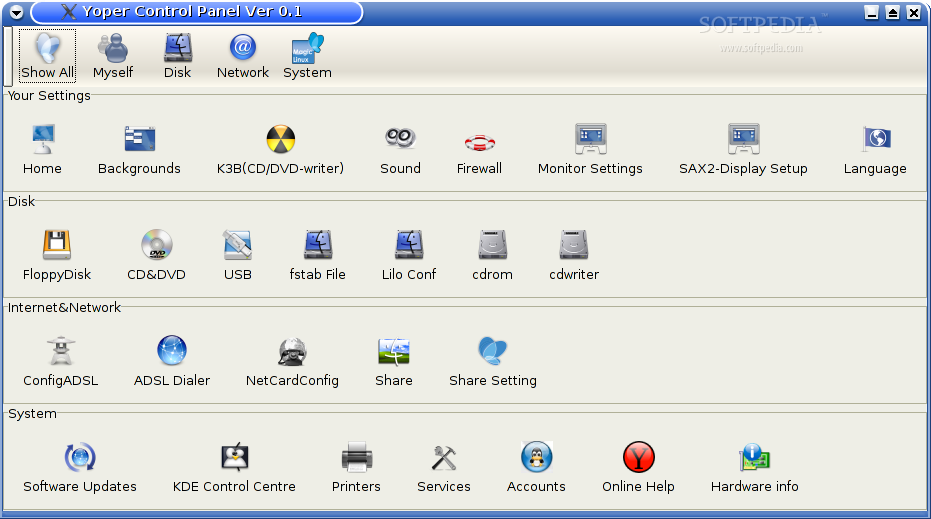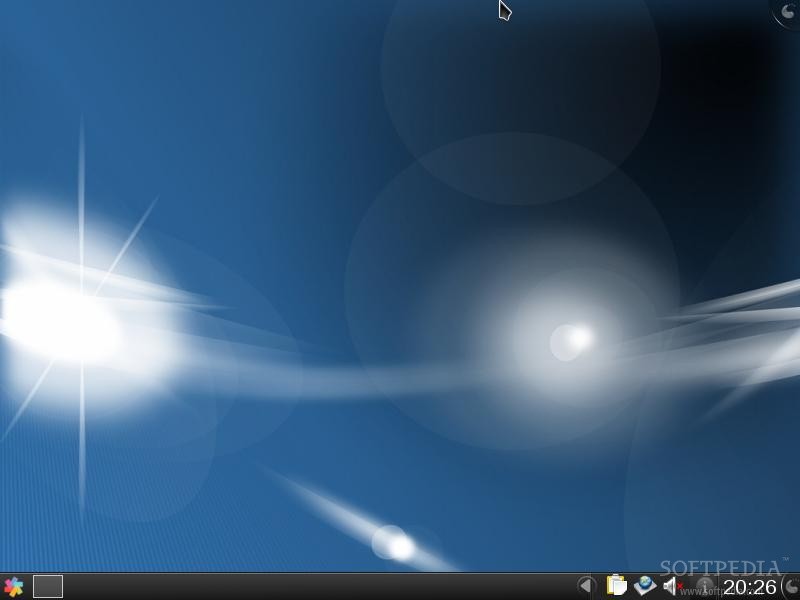Bine ati venit ca musafir! ( Logare | Inregistrare )
  |
 7 Jul 2009, 05:05 PM 7 Jul 2009, 05:05 PM
Mesaj
#1
|
|
 Domnitor       Grup: Membri Mesaje: 2.452 Inscris: 6 November 05 Forumist Nr.: 7.211 |
O distribuţie f. interesantă construită „from scratch” este YOPER!
câteva date: Yoper Linux—Your Operating System—is a Linux distribution for PCs with i686 (Pentium Pro) or higher processor types. It can be used for both desktop and server use and uses hardware recognition tools known from Knoppix. The defining feature of the distribution is a set of custom optimizations intended to make it the "fastest out-of-the-box distribution."[1] The project was originally founded by Andreas Girardet and is currently maintained by Tobias Gerschner.[2] The distribution is scratch-built as opposed to modifying one of the more popular distributions to create a new distribution.[3] Yoper is also the Auckland, New Zealand based company which is developing and selling Yoper Linux. But Yoper also does general UNIX, internet service provider and security consulting and office conversions in New Zealand. Yoper is advertised as the fastest operating system on Earth, out-of-the-box. There is something in it. Speed and responsiveness are their trademarks, but thers is more to Yoper than this. The speed is obtained mainly via prelinking, stripping and package compilation for the i686 architecture (it will work on Pentium II or better). The nice thing is also installation. The stable system installs in 5-10 minutes. Pentru cei obosiţi de clone care dezamăgesc gen Ubuntu, YOPER IS THE ONE! Site-ul YOPER: http://www.yoper.com şi un ftp pt. download: ftp://ftp.yoper.com/pub/yoper   
Acest topic a fost editat de shapeshifter: 7 Jul 2009, 05:26 PM -------------------- Keep calm and host yourself.
|
|
|
|
 7 Jul 2009, 05:35 PM 7 Jul 2009, 05:35 PM
Mesaj
#2
|
|
 Domnitor       Grup: Membri Mesaje: 2.452 Inscris: 6 November 05 Forumist Nr.: 7.211 |
Cloned Distro's: Why Ubuntu sucks and should be banned
DateFriday, July 3, 2009 at 11:48AM Post: duswalk@MrLinux, @veruus Which version of Ubuntu do you recommend? Post: Catpachi@MrLinux can you tell me why ubuntu 9.04 sometimes does't resume from suspend? I get starting and stoping cron anacron until it shuts down To write it down clearly: I don't like clones. There are too many distro's out there as it is. Over the last years I have had many people ask me: I have tried Distro X, Y and Z, can you help me? Just a while back a colleague told me, I have upgraded Ubuntu and now my server won't work, can you help me? Or constantly I get people telling me: "I have tried Clone of Clone X, Y, Z, it looks nice, but then I upgraded and it hosed my system." In general problems can occur in any software, but more in those who are far from mainline and have been hacked around on code that has been maintained and crafted by original distributions. This is true with a clone, even more so with clones of clones or clones of clones of clones. The more removed from mainline or the original developer the bigger the maintenance issues. I do exclude distro's like centos which are straight copies of enterprise ready distributions and really only created to provde free updates to those. They are copies and do not claim to be something special like a clone. The clones are pointless in my humble opinion and the innovation in them is 0. They are the reason that there are too many distro's out there and they are the reason that we don't just focus to get 5 or 6 distros working well but as a community have 1000 badly working distros. I will give 5 quickly hacked down reasons of why cloned distro's and specifically Ubuntu sucks. Why I single out Ubuntu is clear from the last reason and since it probably is the largest clone out there and has spawned many clones of clones of clones of itself, making my point. Reason 1: 0 Innovation Cloning one distro and giving it a few different packages and name and logo and call it a new distro with a new installer is not innovation and does not help the community overall. To call it a new distro is just plain and simply confusing to normal people out there. Greg KH, the kernel developer says it better than I could ever do, Ubuntu overall has contributed 100 kernel patches from 2004-2008, which is 25 per year!!!! Where is your innovation Mr. Shuttleworth? http://www.kroah.com/log/linux/lpc_2008_keynote.html And as a video http://video.google.com/videoplay?docid=3385088017824733336 Reason 2: Unstable Clones are unstable as they usually change those areas where their mother distro are stable and they are several steps removed from mainline where the code actualy gets developed. Ubuntu for example uses the unstable Debian branch and their developers hack around in what has become a nightmare of a package web. Clones cannot by definition be more stable than their parent, which usually are developed by thousands of people full time in companies or communities. Clones battle with their own aggressive release cycles and constantly have to marry back their own changes with the changes in the parent distro. A futile and time consuming task. Clones usually do not test their releases enough and end up only running well on a few developers computers. Their custom kernels can lack features or simply destroy data on systems. In 15 years distro hacking I have seen it all and clones are usually where users get really really burned. Reason 3: Upgrade nightmares Because of 2 upgrading a clone can be disastrous and the update testing done on a distro that constantly release a new version without proper update testing has seen many of my friends dispair with clones and Ubuntu specifically. How can Canonical for instance test upgrades, when they release a new version every 6 month and I am sure most of their users do NOT upgrade to the new release every 6 months. Most of the times they will upgrade afer 3-4 releases, breaking their systems, leaving them frustrated and unhappy in their Linux experience. I had friends jump onto MacOSX, Windows and even Solaris X86 just because one of their upgrades destroyed all their data. Thanks clones. Data loss is more likely to happen with them as their code is far removed from main line and their testing is usualy non existent. Reason 4: Credit where credit belongs I personally recommend enterprise distro's for general use. Due to my involvement in the founding of openSUSE and my work at Novell, I have met many SUSE people. I am a big fan of them and know how hard distro makers at SUSE and RedHat work to make a product or service people actually want to pay money for. I use my own distro called Yoper on my desktop at home, which is not a clone. I also use Windows on my laptop to keep myself in the loop and I also use MacOSX for my Miro TV station. I use SLE and RedHat for work. So I am really quite open minded. With my job comes the realisation that in reality IT is a mixed bag. So credit goes to all those who develop innovative software and don't just plagiarize and steal off other people's ideas without giving them credit. Clones do exactly that they usually just take and take and do not give credit. Reason 5: Yoper When I developed Yoper, there was Mandrake, Debian, Gentoo, RedHat, SUSE, Slackware and a few others that all went back to those few. Most of them Debian Clones. None of them was specifically desktop and speed oriented (apart from Gentoo, which can do anything, but requires skills) and the UI speed of all of them (but Gentoo) was abysmal compared to Windows. In 2001 I sat down and developed the following strategy and after over a year of development I put it on the net calling it Your Operating System, in short "Yoper", which was actually my nickname before that, as I have owned the domain since 1998. The principles of Yoper are and were: - 1 CD desktop centric install - Optimised completely from Scratch for Desktop - Architecture and Run Time optimisations - Source code is unpatched as much as possible and always the latest mainline code - Second CD as a live CD to deliver a terminal-client-like experience - Community based packages freely available - Desktop Experience is paramount - Ease of use and migration for windows users as simple as possible I announced the release in 2002 and as quickly as it gained a following I knew that I had struck a cord. After I went 1.0 in 2003, Yoper ended up #1 on Distrowatch for 3 months as people liked the ideas and downloaded this new and fast desktop centric distro en masse. In 2003 overall Yoper had been downloaded over 5 million times and ranked 6th overall on DW. In Summer 2004 suddenly the neesis country of New Zealand, South Africa comes up with another Debian clone. This time with most of the goals Yoper had. Yoper is not a clone and sports many optmisations clones cannot ever have. Ubuntu a clone that based itself on unstable software of a bloated, but quite a solid distro in its stable version, would target Yoper users and slowly the Yoper userbase stagnated. Giving free CD's away is easy for a millionaire South African. For a poor Kiwi like me it meant paying traffic bills in the tens of thousands of dollars and running up personal debt to support the distro. Beginning of 2006 I gave the maintainership to Tobias, a community member, who continued Yoper fantastically and has given it its build server it needed and continued to expand on the original Yoper ideas. I joined Novell and wanted to concentrate on that fully. Tobias made the distro last, where I started it. It has a very good base and following now and keeps running my desktop fast and better than anything else out there. At Novell I contacted many people at SUSE straight away and got involved in the pre conceptual phases of what was to become openSUSE. I wrote a memo to the SUSE maintainers, which I circulated internally to sell the Yoper ideas. Looking at openSUSE today the whole ecosystem and community reminds me of Yoper and having spend considerable time in Nuernberg and close to SUSE I am a great fan of what they have achieved with real innovation and hard work. openSUSE has a large userbase now and keeps growing, even if it has issues as it certainly does not have the large funds its Enterprise version has. Being the pre cursor to the Enterprise version however will give it its edge compared to anything out there. I do recommend SLE and openSUSE to anyone and certainly also RedHat in the server space. All solid and good innovative distro's. In meantime Ubuntu however keeps dissapointing people as it really is just a unstable debian version without any special innovation. The Ubuntu dev's are managing dozens of various releases and updates for them instead of programming new apps. Launchpad keeps being pushed out. Ubuntu killed the desktop Linux concept for the moment, by hyping it and then not delivering what it promised as it is a clone and not an original distro that is designed to fulfill its goal from ground up. It has completely taken over LUGs, since hobbyist really do not understand the difference between quality and hype. Ubuntu/ Mark Shuttleworth does not give credit to others, be it debian or other developers, kernel people or even distro's like Yoper, that clearly pioneered their ideas. Ubuntu is in my view the paradigm of what makes clones so useless and counter productive to the Linux cause, if there actually is a cause. Acest topic a fost editat de shapeshifter: 7 Jul 2009, 05:38 PM -------------------- Keep calm and host yourself.
|
|
|
|
  |

|
Versiune Text-Only | Data este acum: 20 April 2024 - 04:23 PM |










